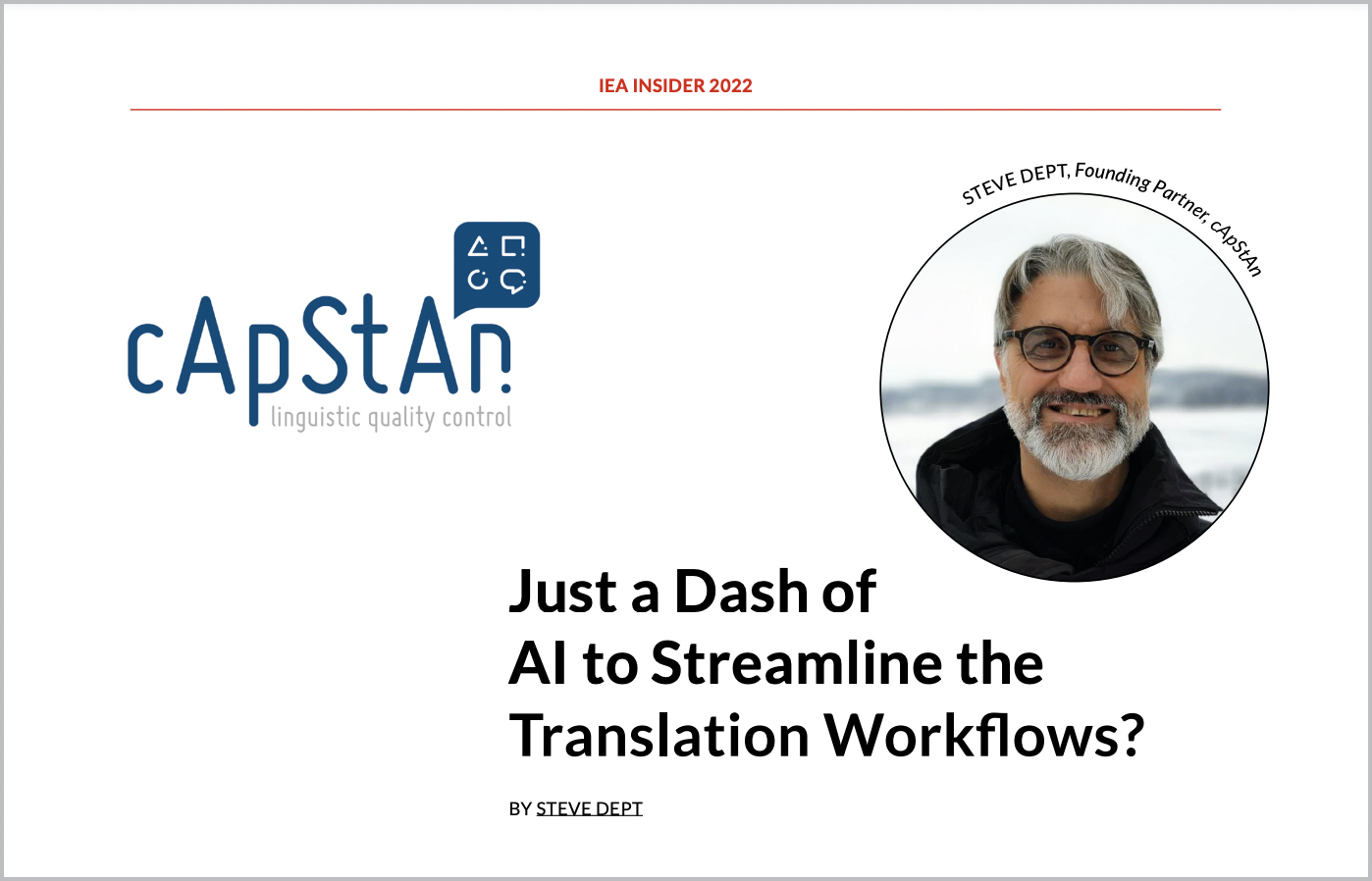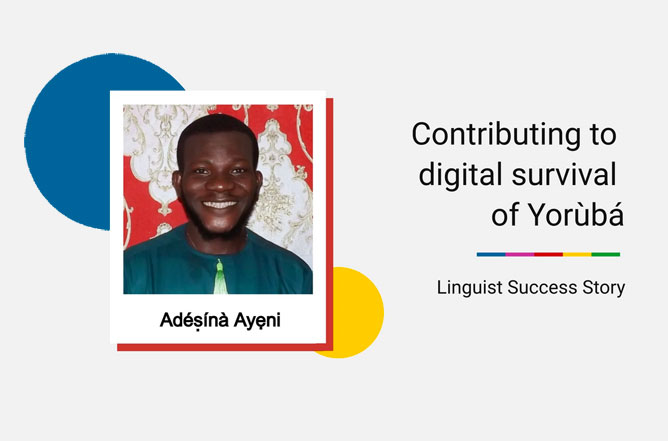Category Archives: Artificial intelligence

Is visual media replacing text as our culture’s dominant form of expression? Pictures’ capacity to convey “a thousand words” is a palpable advantage
Meghan O’Gieblyn is an award-winning author and “spiritual advice columnist” at Wired. In a recent article she reassures us that visual media is not (yet) replacing text as our main form of expression but that do we need to be aware that our relationship to language is changing. On the one hand the artificial intelligence …
Read More
Latest “IEA Insider” now out featuring article by cApStAn LQC co-founder Steve Dept
The latest edition of the International Education Association (IEA)’s newsletter, the IEA Insider, is just out! It is released annually at their General Assembly and this issue features an article by cApStAn founder Steve Dept. In the article Steve talks about cApStAn’s experience with machine translation (MT) and (human) post-editing, and reflects on the role …
“Latest “IEA Insider” now out featuring article by cApStAn LQC co-founder Steve Dept”
Read More
Why TAUS’ 3-step recipe for better machine translation does not work for all
It is true that (much) more than half a century of research into machine translation (MT) has not resulted in a technical solution that comes close to “human parity”, contrary to claims based on obsolete metrics such as BLEU scores. It is also true that we have witnessed significant progress in the quality of raw …
“Why TAUS’ 3-step recipe for better machine translation does not work for all”
Read More
After automated post-editing, APE, the next new hot topic is automated (human) translation error correction, or TEC
Imperfections in machine translation (MT) have long motivated systems for improving translations post-hoc with automatic post-editing (APE). (1) In contrast, up to now, little attention had been devoted to the problem of automatically correcting human-generated translations. A study introducing for the first time ever an automatic human translation correction model (TEC) was presented by language …
Read More
Developing Equitable and Fair Learning Products: A Discussion of Ethical AI in EdTech at the ATP EdTech and Computational Psychometrics Summit
by Pisana Ferrari – cApStAn Ambassador to the Global Village The 2021 edition of the ATP EdTech and Computational Psychometrics Summit (ECPS) took place virtually on December 8th and 9th, 2021. On December 8, in the course of a session titled “Developing Equitable and Fair Learning Products: A Discussion of Ethical AI in EdTech”, leaders …
Read More
In South Africa a new AI-based project offers the opportunity for a large corpus of scientific terms to be translated into six indigenous languages
by Pisana Ferrari – cApStAn Ambassador to the Global Village Language really matters when it comes to scientific communication and education. How can you have conversations about science when the scientific terms you wish to talk about do not exist in your own language? Sibusiso Biyela is a science communicator and journalist from South Africa, …
Read More
Google AI Introduces A Dataset for Studying Gender Bias in Machine Translation
by Pisana Ferrari – cApStAn Ambassador to the Global Village A recent Google AI blog post on the topic of gender bias in machine translation reports an ambitious but sensible endeavour: the creation of a dataset based on translated Wikipedia biographies. The aim of this dataset is to analyze common gender errors in machine translation. …
“Google AI Introduces A Dataset for Studying Gender Bias in Machine Translation”
Read More
Deepfake lip syncing technology could help translate film and TV without losing an actor’s original performance
by Pisana Ferrari – cApStAn Ambassador to the Global Village Dubbing or subtitles, which is better? § An age-old debate came back to the forefront in 2020 with the Oscar win for the South Korean film “Parasite”, where, at the awards ceremony, director Bong Joon-ho made a strong case for subtitles. “Once you overcome the …
Read More
Translations of low-resource languages can now be monetized and contribute to language survival
by Pisana Ferrari – cApStAn Ambassador to the Global Village Adéṣínà Ayẹni is a Nigerian Yorùbá language and culture advocate, anthropological researcher and translator. Yorùbá is a language spoken in West Africa, mostly in the South-West, by ethnic Yorùbá people. Despite having an estimated 45-55 m speakers, it is still a low-resource language. Over the …
“Translations of low-resource languages can now be monetized and contribute to language survival”
Read More
OpenAI’s latest language-generating AI is now out, and it is mindboggling
by Pisana Ferrari – cApStAn Ambassador to the Global Village Over the past few days the internet has been abuzz with talk about GPT-3, OpenAI’s newest AI language model. GPT-3’s predecessor, GPT-2, released in 2019, was already able to produce convincing streams of text in a range of different styles when prompted with an opening …
“OpenAI’s latest language-generating AI is now out, and it is mindboggling”
Read More
Should professional translators shun machine translation?
by Steve Dept, cApStAn CEO Beyond the AI hype and controversial reports about automatic translation achieving parity with human translation, neural machine translation (NMT) has undoubtedly made spectacular progress in the last three years. Should professional translators resist or should they use it? Machine translation software has been around for a long time. In the …
“Should professional translators shun machine translation?”
Read More
The EU’s “Digital Education Action Plan” is currently being updated to address the growing global skills challenge
by Pisana Ferrari – cApStAn Ambassador to the Global Village The 2018 “Digital Education Action Plan” is the last in a long series of initiatives taken by the EU in the field of digital education. It warns of the persistent divide between and within EU Member States, in particular regarding digital infrastructure and skills, all …
Read More